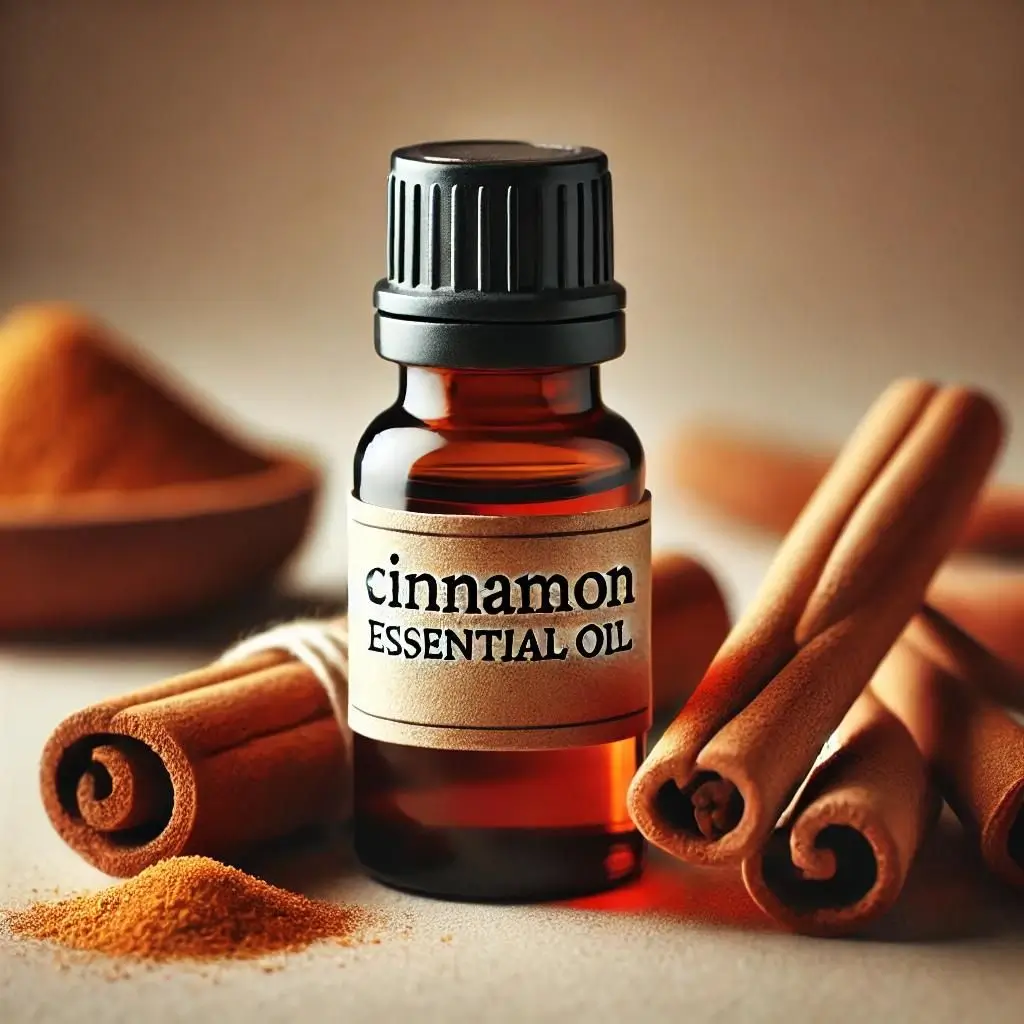Cinnamon essential oil, derived from the bark or leaves of the cinnamon tree, is renowned for its warm, spicy aroma and a multitude of benefits. This versatile oil is used in aromatherapy, skincare, digestion support, and more. With its potent antibacterial, antifungal, and anti-inflammatory properties, cinnamon essential oil can enhance well-being and household applications.
What are the primary benefits of cinnamon essential oil?
Cinnamon essential oil offers a range of benefits that make it a valuable addition to your wellness routine. Here are some of the primary benefits:
1. Antimicrobial Properties
Cinnamon essential oil is known for its powerful antimicrobial properties, which help combat bacteria, viruses, and fungi. This makes it an effective natural cleaner and a protective agent against infections.
2. Anti-inflammatory Effects
The oil’s anti-inflammatory properties can help reduce inflammation and swelling, providing relief from conditions such as arthritis and other inflammatory diseases.
3. Antioxidant Benefits
Cinnamon essential oil is rich in antioxidants, which protect the body from oxidative stress and free radical damage, promoting overall health and longevity.
4. Supports Cardiovascular Health
Studies suggest that cinnamon oil can help improve cardiovascular health by reducing cholesterol levels, lowering blood pressure, and improving blood circulation.
5. Enhances Mood and Cognitive Function
The aroma of cinnamon essential oil can enhance mood, reduce feelings of depression and anxiety, and improve cognitive function and concentration.
6. Boosts Immunity
Cinnamon oil has immune-boosting properties that can help strengthen the body’s natural defenses against illnesses.
7. Aids Digestion
It can aid digestion by reducing bloating, gas, and other digestive discomforts, while also stimulating appetite.
8. Respiratory Support
The oil’s expectorant properties help clear respiratory passages, making it useful for treating colds, coughs, and bronchitis.
9. Pain Relief
Its analgesic properties can help alleviate various types of pain, including muscle aches, joint pain, and headaches.
10. Skin Health
Cinnamon essential oil can improve skin health by treating acne, rashes, and other skin conditions due to its antibacterial and anti-inflammatory properties.
Table: Benefits of Cinnamon Essential Oil
| Benefit | Description |
|---|---|
| Antimicrobial | Combats bacteria, viruses, and fungi |
| Anti-inflammatory | Reduces inflammation and swelling |
| Antioxidant | Protects against oxidative stress |
| Cardiovascular Health | Improves cholesterol levels and blood circulation |
| Mood Enhancement | Reduces depression and anxiety, improves cognitive function |
| Immunity Boost | Strengthens the immune system |
| Digestive Aid | Reduces bloating and gas, stimulates appetite |
| Respiratory Support | Clears respiratory passages, treats colds and coughs |
| Pain Relief | Alleviates muscle aches, joint pain, and headaches |
| Skin Health | Treats acne, rashes, and other skin conditions |

How can cinnamon essential oil be used for aromatherapy?
Aromatherapy is a popular way to harness the benefits of cinnamon essential oil. Here’s how you can use it effectively:
1. Diffusion
Add a few drops of cinnamon essential oil to a diffuser to fill your space with its warm, inviting aroma. This can help purify the air, boost mood, and improve focus.
2. Inhalation
For quick relief, inhale the scent directly from the bottle or from a tissue with a few drops of oil. This method is great for enhancing mood and clearing nasal passages.
3. Blending
Combine cinnamon essential oil with other essential oils, such as lavender or orange, to create a customized aromatherapy blend that offers multiple benefits.
4. Massage
Mix cinnamon essential oil with a carrier oil, like coconut or jojoba oil, and use it for a soothing massage. This can help relieve muscle tension and improve circulation.
5. Bath
Add a few drops of cinnamon essential oil to your bathwater for a relaxing and invigorating experience. The steam will help with respiratory issues while the oil soothes the skin.
Tips for Aromatherapy
- Always dilute cinnamon essential oil with a carrier oil before applying it to the skin.
- Start with a small amount of oil to see how you react to its potency.
- Ensure proper ventilation when diffusing to avoid overpowering scents.
What are the safety tips for using cinnamon essential oil?
While cinnamon essential oil has many benefits, it’s important to use it safely to avoid adverse effects. Here are some safety tips:
1. Dilution
Always dilute cinnamon essential oil with a carrier oil before applying it to the skin to prevent irritation and sensitization.
2. Patch Test
Conduct a patch test before using the oil extensively. Apply a small amount of diluted oil to a patch of skin and wait 24 hours to check for any allergic reactions.
3. Avoid Ingestion
Cinnamon essential oil should not be ingested unless under the guidance of a qualified healthcare professional, as it can be toxic in large amounts.
4. Pregnancy and Children
Pregnant women and young children should avoid using cinnamon essential oil, as it can cause adverse reactions.
5. Photosensitivity
Cinnamon oil can make the skin more sensitive to sunlight. Avoid sun exposure after applying the oil to the skin.
6. Proper Storage
Store the oil in a cool, dark place to maintain its potency and extend its shelf life.
7. Use with Caution
People with sensitive skin or allergies should use cinnamon essential oil with caution, as it can cause skin irritation.
Table: Safety Tips for Using Cinnamon Essential Oil
| Safety Tip | Description |
|---|---|
| Dilution | Always dilute with a carrier oil |
| Patch Test | Test on a small skin area before full use |
| Avoid Ingestion | Do not ingest unless guided by a healthcare professional |
| Pregnancy and Children | Avoid use during pregnancy and on young children |
| Photosensitivity | Avoid sun exposure after application |
| Proper Storage | Store in a cool, dark place |
| Use with Caution | Be cautious if you have sensitive skin or allergies |
Can cinnamon essential oil help with digestion?
Cinnamon essential oil can be a helpful aid for digestive issues. Here’s how it can support digestive health:
1. Reduces Bloating and Gas
Cinnamon oil helps reduce bloating and gas by relaxing the digestive tract muscles and improving the movement of food through the system.
2. Stimulates Appetite
The warm, spicy aroma of cinnamon essential oil can stimulate appetite, making it useful for people experiencing a lack of hunger.
3. Alleviates Nausea
Inhaling the aroma of cinnamon essential oil can help alleviate nausea and vomiting, providing quick relief from digestive discomfort.
4. Antimicrobial Properties
Its antimicrobial properties help combat harmful bacteria in the digestive tract, promoting a healthier gut environment.
5. Improves Metabolism
Cinnamon oil can enhance metabolic function, helping the body process food more efficiently and supporting weight management efforts.
6. Relieves Digestive Cramps
The oil’s antispasmodic properties can help relieve digestive cramps and discomfort caused by conditions like irritable bowel syndrome (IBS).
List: Digestive Benefits of Cinnamon Essential Oil
- Reduces bloating and gas
- Stimulates appetite
- Alleviates nausea
- Antimicrobial properties
- Improves metabolism
- Relieves digestive cramps
Using Cinnamon Oil for Digestion
- Diffuse the oil to inhale its aroma and stimulate appetite.
- Add a few drops to a carrier oil and massage the abdomen to relieve bloating and cramps.
- Inhale the scent from a tissue to alleviate nausea quickly.
How does cinnamon essential oil support respiratory health?
Cinnamon essential oil is beneficial for respiratory health, offering relief from various respiratory issues. Here’s how:
1. Clears Nasal Passages
The expectorant properties of cinnamon oil help clear nasal passages, making it easier to breathe.
2. Reduces Cough
Inhaling the aroma of cinnamon essential oil can reduce the frequency and severity of coughs by soothing the throat and respiratory tract.
3. Fights Respiratory Infections
Its antimicrobial properties help fight off respiratory infections, such as colds and bronchitis, by eliminating harmful pathogens.
4. Soothes Sore Throat
The anti-inflammatory effects of cinnamon oil can soothe a sore throat, providing relief from pain and discomfort.
5. Eases Congestion
Cinnamon oil helps ease congestion by loosening mucus and phlegm in the respiratory tract, facilitating easier expulsion.
6. Boosts Immune Response
By boosting the immune system, cinnamon essential oil helps the body fend off respiratory illnesses more effectively.
Table: Respiratory Benefits of Cinnamon Essential Oil
| Benefit | Description |
|---|---|
| Clears Nasal Passages | Helps clear nasal passages for easier breathing |
| Reduces Cough | Soothes the throat and reduces cough frequency |
| Fights Infections | Antimicrobial properties combat respiratory infections |
| Soothes Sore Throat | Anti-inflammatory effects provide relief from sore throat |
| Eases Congestion | Loosens mucus and phlegm for easier expulsion |
| Boosts Immunity | Enhances the immune response against respiratory illnesses |
Using Cinnamon Oil for Respiratory Health
- Diffuse the oil to inhale its benefits for clearing nasal passages and reducing cough.
- Add a few drops to hot water and inhale the steam to ease congestion.
- Mix with a carrier oil and apply to the chest and throat to soothe a sore throat and boost immune response.
What are the skincare benefits of cinnamon essential oil?
Cinnamon essential oil offers several skincare benefits due to its potent properties. Here’s how it can enhance your skin health:
1. Treats Acne
Cinnamon essential oil’s antibacterial properties help treat acne by eliminating acne-causing bacteria and reducing inflammation.
2. Reduces Signs of Aging
The antioxidants in cinnamon oil combat free radicals, reducing the appearance of fine lines and wrinkles and promoting youthful skin.
3. Heals Skin Infections
Its antifungal and antimicrobial properties help heal skin infections, such as athlete’s foot and ringworm.
4. Improves Skin Tone
Cinnamon oil can improve skin tone by promoting blood flow to the skin, giving it a healthy, radiant appearance.
5. Alleviates Rashes
The anti-inflammatory effects of cinnamon oil can help alleviate rashes and soothe irritated skin.
6. Enhances Complexion
Regular use of diluted cinnamon oil can enhance complexion, making the skin look more vibrant and healthy.
Table: Skincare Benefits of Cinnamon Essential Oil
| Benefit | Description |
|---|---|
| Treats Acne | Eliminates acne-causing bacteria and reduces inflammation |
| Reduces Signs of Aging | Combats free radicals to reduce fine lines and wrinkles |
| Heals Skin Infections | Antifungal and antimicrobial properties heal skin infections |
| Improves Skin Tone | Promotes blood flow for a healthy, radiant appearance |
| Alleviates Rashes | Anti-inflammatory effects soothe irritated skin |
| Enhances Complexion | Regular use enhances skin’s vibrancy and health |
Using Cinnamon Oil for Skincare
- Dilute with a carrier oil and apply to acne-prone areas to reduce breakouts.
- Mix with a face mask to enhance skin tone and reduce signs of aging.
- Add to a foot bath to treat skin infections like athlete’s foot.
How can cinnamon essential oil be used for pain relief?
Cinnamon essential oil can provide effective pain relief for various conditions. Here’s how:
1. Eases Muscle Aches
Its anti-inflammatory and analgesic properties make it effective in easing muscle aches and pains.
2. Relieves Joint Pain
Cinnamon oil can reduce joint pain and inflammation, making it beneficial for conditions like arthritis.
3. Alleviates Headaches
Inhaling the aroma of cinnamon essential oil or applying it to the temples can help alleviate headaches and migraines.
4. Reduces Menstrual Cramps
Massaging diluted cinnamon oil onto the abdomen can help reduce menstrual cramps and discomfort.
5. Soothes Back Pain
Applying a mixture of cinnamon oil and a carrier oil to the back can provide relief from back pain and tension.
6. Treats Inflammatory Pain
Cinnamon oil’s anti-inflammatory properties can treat various types of inflammatory pain effectively.
List: Pain Relief Uses for Cinnamon Essential Oil
- Eases muscle aches
- Relieves joint pain
- Alleviates headaches
- Reduces menstrual cramps
- Soothes back pain
- Treats inflammatory pain
Using Cinnamon Oil for Pain Relief
- Mix with a carrier oil and massage onto affected areas for muscle and joint pain relief.
- Inhale the aroma or apply to the temples for headache relief.
- Add to a warm compress and apply to the abdomen for menstrual cramp relief.
What are the best ways to blend cinnamon essential oil with other oils?
Blending cinnamon essential oil with other oils can enhance its benefits and create pleasant aromatic combinations. Here are some great blends:
1. Lavender and Cinnamon
A blend of lavender and cinnamon essential oils can provide a relaxing and soothing aroma, perfect for stress relief and sleep support.
2. Orange and Cinnamon
Combining orange and cinnamon oils creates a warm, uplifting scent that can boost mood and energy levels.
3. Eucalyptus and Cinnamon
This blend is excellent for respiratory support, combining the decongestant properties of eucalyptus with the warming effects of cinnamon.
4. Peppermint and Cinnamon
Peppermint and cinnamon oils together can provide a refreshing and invigorating blend, ideal for enhancing focus and energy.
5. Frankincense and Cinnamon
A blend of frankincense and cinnamon oils offers a grounding and calming aroma, great for meditation and relaxation.
Table: Essential Oil Blends with Cinnamon Oil
| Blend | Benefits |
|---|---|
| Lavender and Cinnamon | Stress relief, sleep support |
| Orange and Cinnamon | Mood boost, energy enhancement |
| Eucalyptus and Cinnamon | Respiratory support |
| Peppermint and Cinnamon | Focus and energy enhancement |
| Frankincense and Cinnamon | Grounding, calming, ideal for meditation |
Tips for Blending Oils
- Start with a small amount of each oil to test the blend.
- Use a carrier oil to dilute the blend before applying it to the skin.
- Experiment with different combinations to find your favorite blends.
How does cinnamon essential oil enhance mood and energy?
Cinnamon essential oil is known for its ability to enhance mood and energy. Here’s how it works:
1. Stimulates the Mind
The stimulating aroma of cinnamon oil can help enhance focus and concentration, making it easier to stay alert and productive.
2. Reduces Stress
Inhaling the warm, comforting scent of cinnamon essential oil can help reduce stress and anxiety, promoting a sense of calm and relaxation.
3. Boosts Energy Levels
Cinnamon oil can provide a natural energy boost, helping to combat fatigue and increase overall vitality.
4. Improves Cognitive Function
Studies suggest that the aroma of cinnamon oil can improve cognitive function, including memory and processing speed.
5. Enhances Mood
The uplifting scent of cinnamon oil can help improve mood and reduce feelings of depression.
6. Promotes Relaxation
Cinnamon oil can promote relaxation, making it easier to unwind and de-stress after a long day.
List: Mood and Energy Benefits of Cinnamon Essential Oil
- Stimulates the mind
- Reduces stress
- Boosts energy levels
- Improves cognitive function
- Enhances mood
- Promotes relaxation
Using Cinnamon Oil for Mood and Energy
- Diffuse the oil in your workspace to enhance focus and productivity.
- Inhale directly from the bottle or from a tissue for a quick mood boost.
- Add to a massage blend to combine relaxation with energy-boosting effects.
What are some household uses for cinnamon essential oil?
Cinnamon essential oil can be a versatile addition to your household routine. Here are some ways to use it:
1. Natural Air Freshener
Diffuse cinnamon oil to naturally freshen the air in your home, providing a warm and inviting aroma.
2. Cleaning Solution
Add a few drops of cinnamon oil to your cleaning solutions to harness its antimicrobial properties and leave a pleasant scent.
3. Pest Repellent
Use cinnamon essential oil to repel pests like ants and mosquitoes by diffusing it or adding it to a spray bottle with water.
4. Laundry Freshener
Add a few drops of cinnamon oil to your laundry to give your clothes a fresh, spicy scent.
5. Mold and Mildew Treatment
Cinnamon oil can help treat mold and mildew due to its antifungal properties. Add to a spray bottle with water and apply to affected areas.
6. Furniture Polish
Mix cinnamon oil with a carrier oil, such as olive oil, to create a natural furniture polish that leaves your wood looking shiny and smelling great.
List: Household Uses for Cinnamon Essential Oil
- Natural air freshener
- Cleaning solution
- Pest repellent
- Laundry freshener
- Mold and mildew treatment
- Furniture polish
Using Cinnamon Oil in the Household
- Diffuse the oil to freshen the air and repel pests.
- Add to cleaning solutions for enhanced antibacterial effects.
- Mix with water in a spray bottle for mold and mildew treatment.
Conclusion
Cinnamon essential oil is a powerful and versatile oil with numerous benefits and uses. From enhancing mood and energy to supporting respiratory health and providing effective pain relief, this essential oil can be a valuable addition to your wellness and household routines. Remember to use it safely by diluting it properly and conducting a patch test before extensive use.



